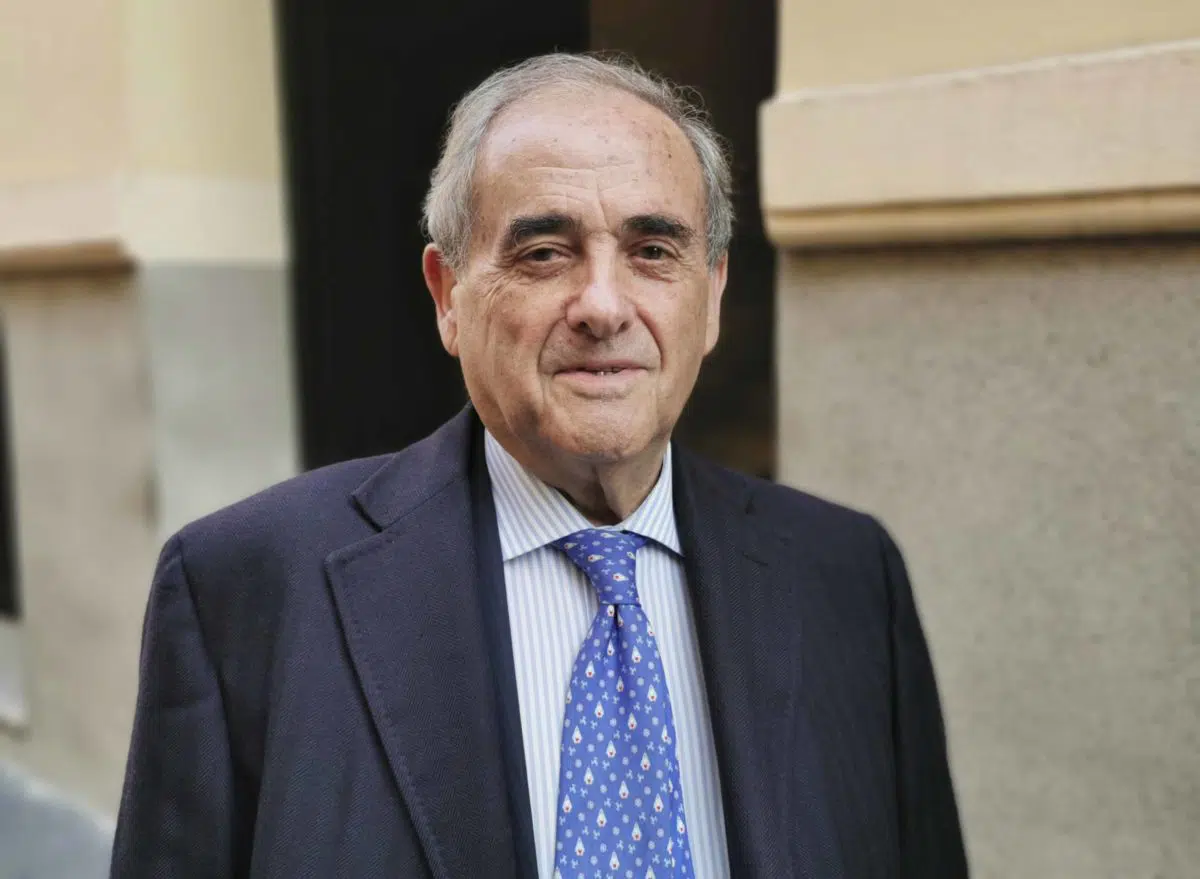
Firmas
Opinion | Lawfare and attack on the rule of law in Spain

Cristina Dexeus is the president of Asociacion de Fiscales (AF) spanish prosecutors' association, the main one of the three existing associations. Picture: Carlos Berbell/Confilegal.
The precedents of attacks on the rule of law in the European Union
29/2/2024 13:54
|
Actualizado: 29/2/2024 18:09
|
The temptation of some political leaders to control the judicial system is a phenomenon that causes concerns in Europe.
The attempt to approve an Amnesty Law in Romania in 2019 to benefit officials affected by corruption generated action by the European Commission through its former president Jean Claude Juncker. This proposal was accompanied by modifications to the legislation of the Judiciary carried out between 2018 and 2019, with a serious impact on the independence, quality and efficiency of the judicial system, through the establishment of measures that affected responsibility, access, dismissal, statute and appointment of prosecutors with responsibilities in prosecuting corruption crimes, in addition to other regulations that affected judges, including their disciplinary responsibility in these cases. Within the framework of the European Union, the Cooperation and Verification Mechanism established by the European Union in relation to Romania maintains monitoring, of which its 2021 and 2022 reports can be noted. The Group of States against Corruption (GRECO) of the Council of Europe opened an ad hoc procedure in 2018 that remains open.
In Poland, the successive reforms developed between 2015 and 2017 on the appointment of magistrates of the Constitutional Court, the integration of the Public Prosecutor’s Office in the Ministry of Justice, the access to the judicial function, the appointment of the Judicial Council and the judicial organization in prejudice to independence and the standards of the rule of law motivated the opening of an ad hoc GRECO file, whose latest report is dated 2021.
GRECO also opened a procedure in 2019 for parliamentary interference in Slovenia on the actions of prosecutors and judges aimed at investigating their actions in the investigation of corruption crimes committed by a prominent politician.
A 2018 reform in Hungary to the detriment of judicial independence led to decisions to activate Article 7 of the Treaty of the European Union due to a breach of the principles of the rule of law and, in May 2022, the freezing of millions of euros of funds from cohesion.
Whether due to legal modifications (cases of Hungary, Poland and Romania), or to interference in the fight against corruption (Slovenia), both the Council of Europe and the European Union have found ways to ensure the defense of the rule of law.
The current situation in Spain
The current situation is based on an agreement signed in Brussels on November 9, 2023 between the Socialist Party (PSOE) and a right-wing separatist party (Junts per Catalunya) in which the latter facilitates the government of the former in exchange for the forgiveness of certain crimes, which include corruption, terrorism and money laundering, through the amnesty formula. These crimes are committed during the so-called Catalan independence «procés», committed by politicians of autonomous government, consisting of the use of the Catalan Parliament to dictate “disengagement” regulations through an illegitimate referendum not complying with the democratic standards and in a declaration of independence outside the law and constitutionally conferred powers, using public money and violence in the streets. The objective of this contribution is not the analysis of the bill, nor it is the assessment of the political agreements as such. However, the agreement implies establishing a public narrative based on a re-reading of the trials held and pending because of the riots that occurred in Catalonia in 2017 and here is where our concerns as public servants are raised.
According to this political agreement, the origin of those events is found, first, in the ruling of the Constitutional Court 114/2017, of September 6, which declared unconstitutional the Law of the Parliament of Catalonia 19/2017, of September 6, by which a referendum was called.
But the main cause for concern stems from the fact that the political agreement transfers the responsibility for the crimes investigated and tried or pending prosecution to the actions of the police, the judges and the prosecutors who defended the Spanish legal system. As a fundamental milestone, note that the Supreme Court ruling 459/2019, of October 14, after a public trial broadcast by all the media, convicted many senior political officials of the autonomous Government of Catalonia, except for those who left Spanish territory, to different penalties for crimes that include a form of corruption such as embezzlement, sedition and disobedience.
After the agreement, two parallel political activities arise, the first the creation of a parliamentary commission in December 2023 and the second the extension of a public narrative that affirms the partiality of those who must apply the law through an English expression until then unknown in Spain: lawfare. Therefore, the idea that Justice acts partially and for undemocratic purposes is conveyed to the public opinion.
The creation of the parliamentary commission
On December 21, 2023, the Congress approved the creation of a “Commission of investigation into the so-called Catalunya operation and the actions of the Ministry of the Interior during the Partido Popular governments in relation to the alleged irregularities that link senior officials and police commanders with the existence of a parapolice plot», which includes as its objective «proposing the appropriate control, investigation and prevention measures to protect democracy from abuses and misuses by certain powers and services of the State, against the full exercise of civil and political rights.”
In the parliamentary debate in which the creation of the commission was approved, the representative of Junts per Catalunya in the Parliament highlighted that it was about supervising the actions of senior police officials, journalists and judges whom she singled out by name and surname; and that is the idea also conveyed to the media.
This parliamentary activity to control open criminal cases is not in line with the purpose of Parliamentary investigative commissions.
The political discourse against the actions of judges and prosecutors
The political narrative that blames the actions of defenders of the rule of law for the political situation in Catalonia in 2017 is varied in terms of the actors involved and the specific people mentioned.
It is important to highlight that some members of the Government have made public statements alluding to the existence of lawfare. The President of the Government did on November 30, 2023, without referring to specific people. A few days before, the Minister responsible for transport had done the same. The first Vice President accused a judge of lawfare referring to him by name and surname on January 19, 2024.
The Parliament has been the scene of different sessions in which some MPs have disqualified specific judges in matters related to professional actions within the framework of open or sentenced criminal proceedings. It happened in the plenary sessions of January 16 (MP representing Podemos), January 24 (Sumar MP), and January 29, 2024 (BNG MP). The session of January 30, 2024 is full of disqualifications of judges with names and surnames by members of different political parties: Sumar, Junts and Podemos criticized different judges and ERC, Bildu and the BNG did so in a generic way.
The same scene is observed in the Senate. A senator from Junts per Catalunya disqualified two prosecutors in the session of February 20, 2024.
The Parliament of Catalonia also recorded an incident on November 16, 2023 in which the person in question was a prosecutor, who was publicly disqualified by a political representative.
Public statements by political parties have followed this narrative. The PSOE did it on January 29, 2024, Sumar on the same day, and Podemos on February 1, 2024. The list goes on.
The reaction of the General Council of the Judiciary to lawfare has been expressed through a press release dated November 9, 2023, reiterated on December 5 to extend it to the creation of parliamentary commissions that could eventually summon judges, and an institutional statement dated February 5, 2024. The Prosecutor General has come out late and timidly to defend the prosecutors who intervene or have intervened in the different criminal proceedings, although he has been criticized for not doing the same with the judges. Finally, the minister responsible for Justice has made some timid statements denying the existence of lawfare in contrast with some other members of the Government.
Article 399 of Organic Law 16/1985, of the Judiciary establishes that «civil and military authorities will refrain from from giving orders to Judges and Magistrates and from summoning them to appear in their presence.»
Behind this debate there is another one that is not new in Spain. Recurrently, when a criminal investigation is opened against a political official, reference is made to an alleged “judicialization of politics”, that is, the transfer of matters that are in the political sphere to the judiciary. There is also recourse to the “politicization of justice”, that is, to an apparent political interest of those who intervene in justice. Prosecutors, police and judges must act against any alleged crime regardless of who is responsible and, of course, that includes crimes that have been committed by those who assume responsibilities in the political order. These mentions are still forms of pressure and criticism that occur when action is taken and when action is not taken, whether those investigated belong to one side of the parliamentary arc or to the other. Nothing new.
The allusions to lawfare are a new phenomenon, an important twist in the pressure mechanisms on the judicial system as a whole. Public discourse conveys to society the idea of partial and undemocratic behavior on the part of those who carry out their duties in the investigation, prosecution, and conviction of crimes. The performance is decidedly concerted and sometimes with calculated ambiguities. The expressions are made from members of institutional and constitutional powers, including the president and those responsible for the government, parliamentary groups, and political parties. And specific judges and prosecutors are mentioned indiscreetly.
It can be pointed out with Pérez Sánchez that «the intention consists of showing that the judges and courts have acted motivated by political motivations and against certain ideologies, in such a way that the judicial processes and the sentences pronounced are not due to the application of the laws but to political persecution.»
With these expressions, a judicial action beyond what is improper is conveyed to public opinion and is legally classified as constituting the crime of prevarication. With the aim of justifying a fallacious story, the responsibility for crimes against democracy is transferred to the judges, the current open interventions are put under pressure and those that may come to establish the application of the amnesty to which these interventions come to complement are anticipated.
In short, the State’s own actions are delegitimized. On the contrary, as Silva Sánchez points out, “whoever claims that lawfare is being used against him or his people is actually expressing something else: the permanent totalitarian aversion to the rule of law.”
The repeated references to lawfare constitute a sophisticated and innovative form of attack on the independence of judges and prosecutors and a form of pressure on the judicial system as a whole.
Conclusions
The opening of parliamentary investigation commissions to evaluate the performance of judges, prosecutors and the police is an interference in their proper functioning. The assertion of political interests by those who have the responsibility of investigating, prosecuting and convicting crimes, which they cannot otherwise avoid, is unacceptable.
Spanish society understands that if crimes have been committed, must be investigated and prosecuted and that those responsible are those who have engaged in the conduct provided for in the Penal Code and not those who must apply the rules. The rule of law requires respect in the actions between the constituted powers.
The standards of the rule of law are perfectly known, bth in Spain and in the rest of the European Union. As mentioned above, we have close precedents of interference in judicial action, either by approval of amnesties accompanied by reforms of the Public Prosecutor’s Office and the Judiciary, as is the case in Romania, or by political interference through statements in parliament to assess and condition the persecution of crimes including corruption, case of Slovenia. In these cases, different European institutions have found mechanisms to defend their rule of law because they understand that they have acted below the common minimum standards.
Spain is living a period of delegitimization of legal institutions by attacks coming from the political power. Targeting judges and prosecutors, with or without mentioning their names, interferes in an inacceptable way with the proper functioning of the rule of law.
Bibliography
A. Bar Cendón, “La guerra de [contra] los jueces”, Aragón, M, Gimbernat, E., Ruiz Robledo, A. (Dirs.), La amnistía en España: Constitución y estado de derecho, Colex, Madrid, 2024, 393-398.
E. Cobreros Mendazona, “Las comisiones parlamentarias de investigación y sus límites, en especial la presunción de inocencia”, Revista Vasca de Administración Pública. Herri-Arduralaritzako Euskal Aldizkaria, 127, 2023, 17-61.
V. Garrido Mayo, “La degradación del estado de derecho y el falso lawfare”, Aragón, M.
Gimbernat, E., Ruiz Robledo, A. (Dirs.), La amnistía en España: Constitución y estado de derecho, Colex, Madrid, 2024, 399-406.
G. Pérez Sánchez, “Amnistía y «Lawfare»: maquillaje y eufemismo”, Aragón, M, Gimbernat, E., Ruiz Robledo, A. (Dirs.), La amnistía en España: Constitución y estado de derecho, Colex, Madrid, 2024, 411-414.
J. M. Silva Sánchez, “«Lawfare» y neolenguaje político”, Aragón, M, Gimbernat, E., Ruiz Robledo, A. (Dirs.), La amnistía en España: Constitución y estado de derecho, Colex, Madrid, 2024, 419-422.
F. Sosa Wagner, M. Fuertes, “El arquitecto de ruinas”, Aragón, M, Gimbernat, E., Ruiz Robledo, A. (Dirs.), La amnistía en España: Constitución y estado de derecho, Colex, Madrid, 2024, 423-428.
Otras Columnas por Cristina Dexeus:






